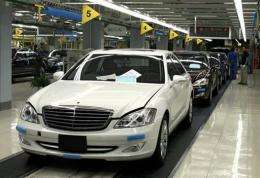Daimler launches first German hybrid car

German luxury car maker Daimler launched its first hybrid model last week, almost 10 years after the market leader, Toyota.
The world's best-selling limousine, a favourite of world leaders, the Mercedes Benz S Class, is now available in Europe with two motors, one electric and the other petrol (gasoline), to save fuel and cut pollution.
The "CO2 champion of luxury cars," as Mercedes bills it, nonetheless cranks out 186-189 grams of carbon dioxide per kilometre, remaining one of the biggest polluters on the road, well above the European average of around 160 grams.
A comparable S model with a normal engine can spew out as much as 234 grams, Daimler counters.
A spokesman added that "we want to launch at least one hybrid model per year."
It is by all accounts a mini revolution in the German auto sector, which generally produces big, powerful cars by brands including Mercedes, Porsche, BMW and Audi.
Porsche plans to roll out a hybrid version of its Cayenne sports utility vehicle in late 2010, and BMW is preparing a saloon (sedan) from its Series 7 line this year, even though it is "too early to speak of full distribution," according to a BMW spokeswoman.
Auto expert Gerd Lottspiesen from the environmental association VCD told AFP that the German car industry "has been asleep for several years."
"It repeatedly dismissed hybrids. If it is finally waking up, it's pretty late" compared with Toyota, which sold its first hybrid Prius model in Europe nine years ago.
Lexus, the luxury line from Toyota, has offered a hybrid system for four years.
"For years, the German automobile sector did not believe hybrids had a chance ... but at a certain point, under market pressure, the industry changed its mind," said Stefan Bratzel, professor at a specialised auto centre in the western city of Bergisch Gladbach.
German companies mainly focused on diesel engines, the specialists noted.
As a result, the German market is dominated by diesels, while hybrids represented only 0.2 percent of the market last year with the sale of 6,500 Toyota, Lexus or Honda hybrids, according to national registration figures.
Since its launch, Toyota has sold 22,000 Prius in France and around 17,000 in Germany, which has a market three times bigger, according to Toyota data.
"The Prius has never been a best-seller here," a spokeswoman for the Japanese group acknowledged.
Germans, who are strongly attached to their national brands, could begin to switch over if domestic hybrid models are available however.
"The environmental trend is becoming dominant," said Frank Schwope, an auto analyst at the NordLB bank.
Daimler is a good example.
Until now it has been considered one of the most resistant to environmental trends.
But in the past few months, Daimler has begun to highlight its determination in the area.
It recently acquired a battery company and a 10 percent stake in the US electric car maker Tesla.
A sign for auto specialists that Germans could be at the leading edge of the next big step, fully electric automobiles.
(c) 2009 AFP



















